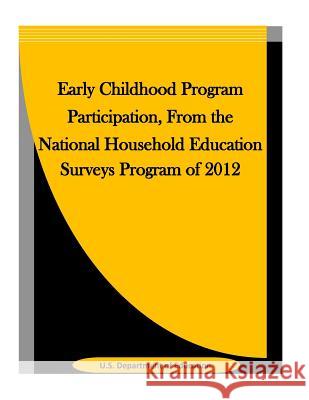Early Childhood Program Participation, From the National Household Education Surveys Program of 2012 » książka
Early Childhood Program Participation, From the National Household Education Surveys Program of 2012
ISBN-13: 9781523423712 / Angielski / Miękka / 2016 / 50 str.
Early Childhood Program Participation, From the National Household Education Surveys Program of 2012
ISBN-13: 9781523423712 / Angielski / Miękka / 2016 / 50 str.
(netto: 56,29 VAT: 5%)
Najniższa cena z 30 dni: 55,53 zł
ok. 13-18 dni roboczych
Dostawa przed świętami

Darmowa dostawa!
This report presents data on the early care and education arrangements and selected family activities of children in the United States from birth through the age of 5 who were not yet enrolled in kindergarten in the spring of 2012. The report also presents data on parents' satisfaction with various aspects of these care arrangements and on their participation in various learning activities with their children. For each category of information included in the report, the results are broken down by child, parent, and family characteristics. The data in this report are from the 2012 National Household Education Surveys Program (NHES:2012) Early Childhood Program Participation (ECPP) Survey. The ECPP survey is used to collect information on children from birth through age 6 who are not yet enrolled in kindergarten. Prior to the 2012 ECPP survey that is the focus of the current report, the survey was last conducted in 2005. The ECPP asks detailed questions about children's participation in relative care, nonrelative care, and center-based care arrangements. It also asks about the main reason for choosing care; what factors were important to parents when choosing a care arrangement; what activities the family does with the child, such as reading, singing, and arts and crafts; and what the child is learning, such as counting, recognizing the letters of the alphabet, and reading. As noted above, the ECPP asks detailed questions about children's participation in relative care, nonrelative care, and center-based care arrangements. However, children can have more than one care arrangement within a particular type of care (e.g., two relative care arrangements). Parents were instructed on the questionnaire to answer the detailed questions about the person or center that provided the most care. The tables in this report refer to these arrangements as "primary" arrangements. Children can have multiple primary care arrangements across arrangement types (e.g., primary relative care and primary center care). This report (NCES 2013-029.REV) is revised from an earlier version of the report (NCES 2013-029) that was released in August 2013. This updated version is based on estimates that utilize the final NHES:2012 data, for which survey weights have been corrected. The correction in survey weights has led to small changes in the estimates presented, typically of one to two percentage points. The revised report also revises the estimates related to children's parents so that they are more consistent within tables and so that the parent(s) reported by the survey respondent, regardless of whether a birth, adoptive, step, foster parent or a grandparent, aunt, uncle, or another guardian in the household, is counted as a parent/guardian.











